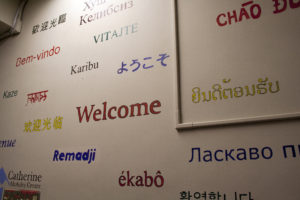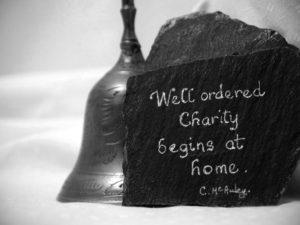 Last week at the Cedar Rapids Public Library the Cedar Rapids Civil Rights Commission hosted the event, “Forum on Protecting Arab, Muslim, Sikh, and South Asian Communities.” This educational program focused on the definition of “hate crimes,” and included presentations and panels discussing the legislative processes, local resources, and opportunities to assist affected communities.
Last week at the Cedar Rapids Public Library the Cedar Rapids Civil Rights Commission hosted the event, “Forum on Protecting Arab, Muslim, Sikh, and South Asian Communities.” This educational program focused on the definition of “hate crimes,” and included presentations and panels discussing the legislative processes, local resources, and opportunities to assist affected communities.
The Catherine McAuley Center (CMC) consistently works with diverse, and oftentimes marginalized, groups. In 2016 the Adult Basic Education Program alone had 404 students representing 49 countries from around the world. Taking opportunities like this forum to learn how to advocate and protect members of our CMC community aligns with our values– supporting inclusive communities that welcome, respect, and support a diversity of individuals and ideas. Communication and Administrative Intern, Madison Clark, attended the event due to her belief in this tenet, and to share this valuable information with a wider audience!
What is a hate crime?
Representatives from the U.S. Department of Justice, the Iowa Department of Human Rights, and the Anti-Defamation League of the Plains States Region explained that hate crimes are difficult to prosecute due to their nature. Unlike most other crimes, the prosecutor is expected to prove the motive of the defendants instead of simply proving the crime happened.
A hate crime can include, but is not limited to:
- Violent acts enacted on a person, their property, or a place of worship,
- Threats of violence,
- Attempts to intimidate or interfere with living
- Obstruction of free exercise
- Conspiracy against rights
- Trespassing
Hate crimes are not common in Iowa, and are especially uncommon within the Cedar Rapids community. Knowing the scope of potential issues will simply help community members continue to protect the individual rights of everyone who call Cedar Rapids their home.
When and to whom should concerns be reported?
According to the law enforcement panel, hate crimes go tremendously under-reported. This means that the current data being worked from is not covering the full scope of issues being faced by marginalized communities. With this in mind, the representatives made it overwhelmingly clear that individuals should report any concerns to their local law enforcement, even if it’s only a suspicion, and that they should be reported right away.
The panel explained that the possibility of something being a hate crime, regardless of whether or not it’s prosecuted that way, is always noted. This is so future incidents might have better evidence behind them that could enable victims receive justice. Basically, if it looks and feels like a hate crime, law enforcement will respond to it as such.
If there’s been an incident that could potentially be a hate crime, call the non-emergency number, or 911, depending on the urgency of the situation.
How can we address the growing tensions?
The community panel, including representatives from the Eastern Iowa Islam, Sikh, and Hindu communities, followed the law enforcement panel. This group spent time discussing how recent political tensions have increased the threat of hate crimes towards their communities, as well as what others might be able to do to help.
Overwhelmingly, the community members agreed that what would have the greatest effect would be getting the Cedar Rapids community involved in education sessions about each group. They felt that educating and increasing community awareness would lead to a more enriched community through diversity and new perspectives. Each group’s community center offers trainings, tours, and will welcome anyone interested in learning more. They also expressed a willingness to collaborate with other community groups, businesses, or schools on events ranging from volunteering to positive media campaigns supporting diversity.
When a crime motivated by bias occurs, it reverberates throughout all communities. This forum aimed to say, “You are not alone,” to the people of many diverse perspectives and practices who call Cedar Rapids their home. Many groups have started to see a rise in threats and tensions over the last few years, and it’s the responsibility of Cedar Rapids residents to create a safe and inviting community for everyone. CMC aims to supports this effort, and believes everyone has, and should continue to have, the potential to create and live a purposeful and fulfilling life.

